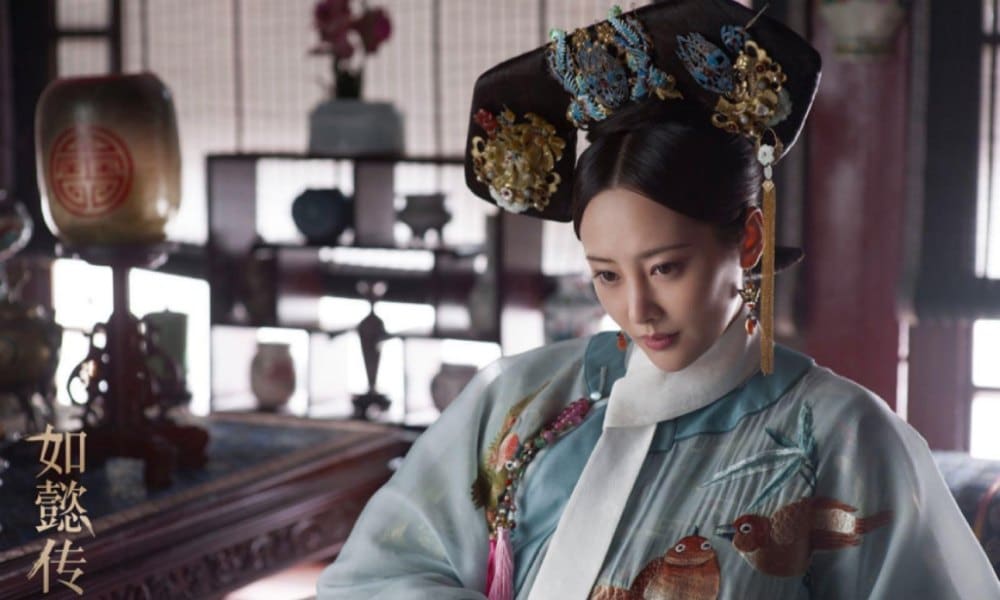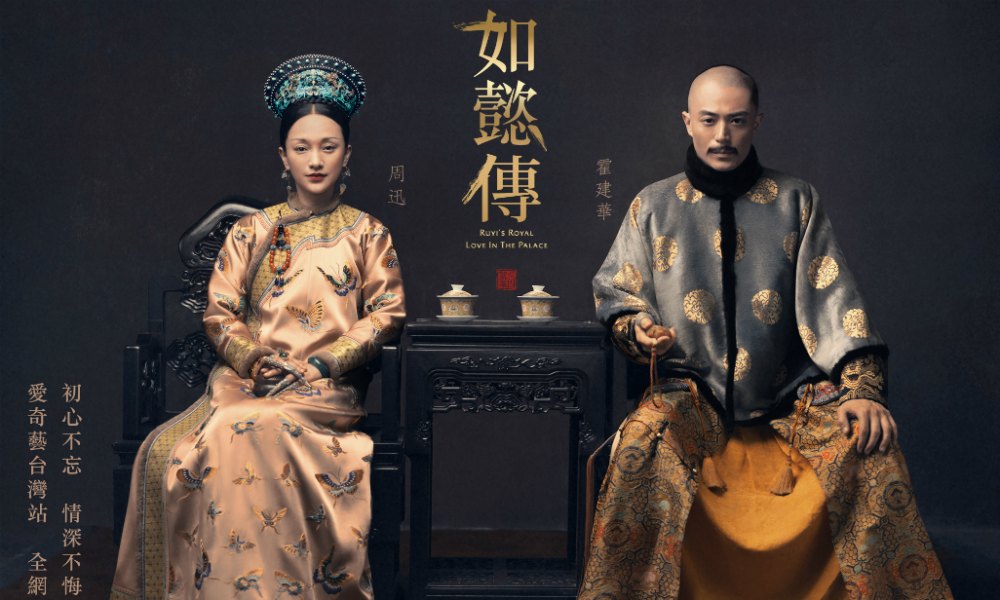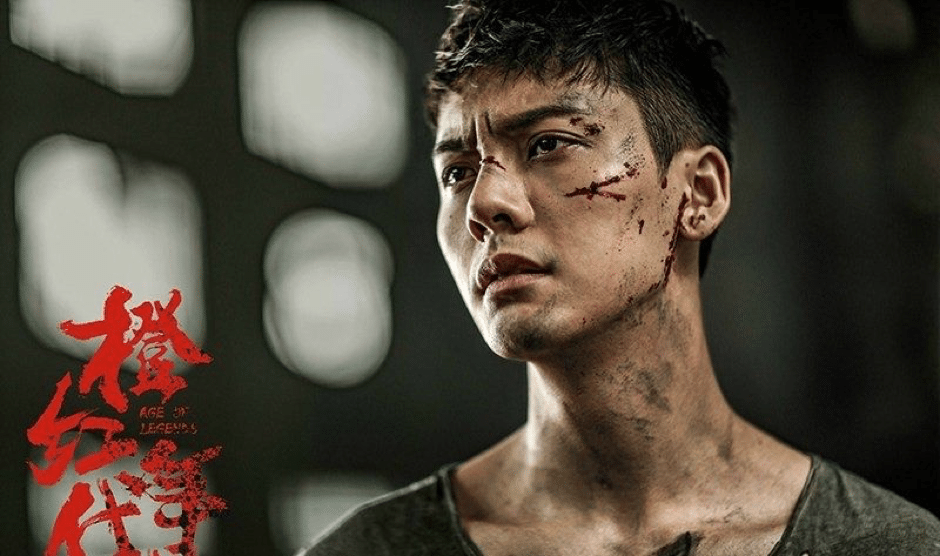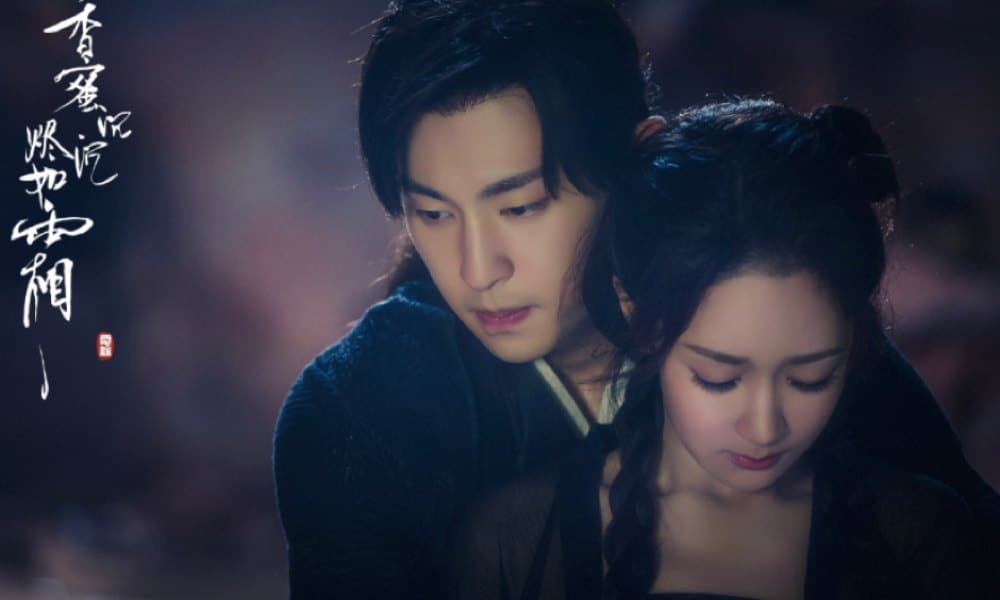China Arts & Entertainment
Top 10 Overview of China’s Most Popular TV Dramas of Fall 2018
The top scoring TV dramas in China of this moment – and they are almost all available with English subtitles.
Published
6 years agoon
By
Gabi Verberg
From beautiful costume series to suspenseful war-themed productions – these are the most popular TV dramas in China of this fall, an overview by What’s on Weibo.
Note: also see our Top 30 of all-time classic Chinese TV Dramas here!
China still has one of the most booming TV drama industries in the world, with dozens of new dramas being released every month, drawing in millions of viewers through the country’s most popular online video streaming platforms.
We’ve compiled a top ten of the most popular Chinese TV dramas of this fall, based on the current popular charts of the leading websites in Chinese online video, including Tencent Video, iQiyi, Sohu, Youku, LeTV, 360kan, Sogou Video, along with Baidu’s and Weibo’s popular TV drama charts.
This fall, Chinese viewers are mostly into dramas that are themed around (historical) love stories and suspense. What is noteworthy is that the often top-rated South-Korean tv dramas are not making it to the list of top-watched series this time, and that the current top 10 series are all produced in mainland China.
Please note that this list has been compiled by combining the top-ranking lists of this moment. And we have chosen to exclude popular drama series that already made it in our previous top-ten lists, such as White Deer Plain (白鹿原), despite their ongoing popularity.
Most of these series are available for viewing online with English subtitles. If you need a VPN to circumvent any geo restrictions, we recommend either NordVPN or ExpressVPN to do so.
#10 All Out of Love (凉生我们可不可以不忧伤)

Mainland China
Chinese title: Liáng shēng wǒmen kěbù kěyǐ bù yōushāng 凉生,我们可不可以不忧伤
Genre: Romance
Directed by: Liu Junjie (刘俊杰)
Episodes: 70, start 17 September 2018, Hunan TV
All Out of Love is based on the novel Liang Sheng, Can We Not Be Sad by Le Xiaomi (乐小米, also known as 纪伟娜). The TV series stars, among others, Wallace Chung (钟汉良), Ray Ma (马天宇) and Sun Yi (孙怡).
The series ranked fifth in the Weibo top ten most popular TV dramas and sixth position in the Youku top 10 TV drama series. Tencent Video ranked the series with an 8.2.
Growing up in rough times and poverty, Jiang Sheng and her adopted brother Liang Sheng are inseparable. Throughout the years, their greatest happiness lies in being by each other’s side. They eventually both develop feelings for one another, but despite them not being blood-related, they ignore their feelings. One day Liang mysteriously disappears, and Jiang is unable to find him. Years later, when Jiang is married, Liang suddenly comes back, and Jiang needs to face what is perhaps the most important decision of her life.
On Weibo, the official account of the series is nearing 375,000 fans right now.
See here the complete series including Chinese subtitles. Also available on Viki (incl. English subtitles).
#9 Battlefield Gun King (战地枪王)

Mainland China
Chinese title: Zhàndì qiāng wáng 战地枪王
Genre: War
Directed by: Li Yin (李印)
Episodes: 40, start 30 September 2018, Tianjin TV
Battlefield Gun King is the sequel in the ‘Gun King’ series following up The King of Guns (绝地枪王). However, it’s not really necessary to see the first series in order to understand this sequel.
Battlefield Gun King is currently ranking third place in the Sohu hotlists, and fifth place on the Youku most-watched lists. On iQiyi, the series scores a 7.1.
The TV drama tells the patriotic story of a family from China’s northeast, military hero Lu Yinghao, and the Chinese Communist Party’s fighting against the Japanese aggressors. It is 1945, and Lu Yinghao returns to China from the Soviet military base to celebrate his father’s birthday. At his arrival, he discovers that the Japanese military killed his family, mostly doctors, and other medical staff, to occupy the hospital. He decides to take revenge.
On Weibo, the official TV series account has approximately 22,000 fans.
See here on iQiyi the complete series with Chinese subtitles (no English).
#8 Mother’s Life (娘道)

China Mainland
Chinese title: Niángdào 娘道
Genre: Drama
Directed by: Guo Jingyu (郭靖宇) and Ju Xingmao (巨兴茂)
Episodes: 76, start 5 September 2018, Beijing TV and Jiangsu TV
Mother’s Life, starring Yue Lina (岳丽娜) and Yu Yi (于毅), tells the story of a young woman in times of China’s political turmoil around 1945.
The drama series is currently ranked first in the Sohu TV top ten, ranked seventh in the Weibo’s top 10 most popular TV dramas and is amongst the most popular series on Tencent Video.
Ying Gu is a young lady from a wealthy and influential big family. In the eight years she is married to her husband Long Jizong, they have three daughters. But when their third daughter is labeled a misfortune bearer, Ying Gu and her husband Xu Zhi are forced to move. Shortly after, Xu Zhi dies, leaving the pregnant Ying Gu all alone, which causes her to marry an opium addict out of desperation. One day, her new husband sells her third daughter to provide him with drugs. By taking out her rage, Ying Gu ends up in prison, where she thinks of a plan to reunite with her children.
See here the complete series including Chinese subtitles (no English).
#7 Ruyi’s Royal Love in the Palace (如懿传)

China Mainland
Chinese Title: Rúyì chuán 如懿传
Genre: Historical Drama
Directed by: Wang Jun (汪俊)
Episodes: 87, 20 August 2018, Tencent Video
Ruyi’s Royal Love in the Palace is an adaption from The Story of Empress Ruyi (后宫·如懿传) written by Liu Lianzi (流潋紫). In total, the book consists of six volumes which mainly tells the follow-up story of Empress in the Palace (后宫·甄嬛传) which subsequently was also made into a drama series in both 2011 and 2017. The 2017 production did not make this selection, however, it is currently ranked the most popular TV drama on LeTV.
Ruyi’s Royal Love in the Palace starring Zhou Xun (周迅) and Wallace Huo (霍建华) is currently ranked number one most popular series on 360kan, and number six on Baidu’s most popular drama list.
This fictional historical drama chronicles the marriage of Emperor Qianlong and his childhood friend and lover Ruyi. As Ruyi is a descendant of the Ulanara clan, she is only granted the position of consort. With the Empress Dowager as her sworn enemy, and dealing with the other consorts’ jealousy of her relationship with Qianlong, Ruyi faces many hardships in the palace. However, she is determined to become Empress Dowager of the Middle Kingdom.
With more than a million followers on the drama’s official Weibo account, it is one of the more popular TV series on social media in this list.
See here the complete series including Chinese and English subtitles, or watch on Viki.
#6 Martial Universe (武动乾坤之英雄出少年)

China Mainland
Chinese title: Wǔ dòng qiánkūn zhī yīngxióng chū shàonián 武动乾坤之英雄出少年
Genre: Fantasy, History, Martial Arts
Directed by: Zhang Li (张黎), assistant director Han Xiaojun (韩晓军)
Episodes: 40, 7 August 2018, Dragon TV
Just like Battle Through the Heaven, Martial Universe is based on a novel by author Li Hu (李虎), and was only published online.
This series starring Yang Yang (杨洋), Zhang Tianai (张天爱), Claudia Wang (Wang Likun/王丽坤), and Chun Wu (吴尊), is currently second most popular TV drama on Youku and third most popular series on Sogou Video.
This fantasy drama tells the story of Lin Dong, who, by coincidence, comes across a talisman with magical powers. After this encounter, his life will never be the same. Lin travels the world, and through his often very dangerous adventures, he gradually improves his skills as a martial artist. But will it be enough to face evil and save the world from demons taking over?
See here the complete series including English subtitles.
#5 Eagles and Youngster (天坑鹰猎)

China Mainland
Chinese title: Tiān kēng yīng liè 天坑鹰猎
Genre: Youth, Adventure, Suspense
Directed by: Cheng Zhichao (成志超)
Episodes: 40, 30 August 2018 on Youku, 25 September at Dragon TV
Eagles and Youngster is a coming-of-age story, adapted from the novel with the same name written by Zhang Muye (张牧野).
The series is currently ranked first in the Youku TV drama charts and ranking fourth in the Weibo’s top 10 most popular TV dramas.
With main characters played by Karry Wang (王俊凯) born in 1999, Vicky Chen (陈文淇) born in 2003, and supporting actress Jiang Yiyi (蒋依依) born in 2001, the cast of Eagles and Youngsters is the youngest amongst this list.
Eagles and Youngster revolves around city boy Zhang Baoqiang, who goes on an adventure with his two friends to find medicine to save their mentor’s life. On their way, Zhang accidentally finds an egg that hatches into a majestic white eagle. The creature ignites a series of events that put the young heroes in danger, and they begin to understand the meaning of life and deepen their understanding of the relationship between humankind and nature.
The series currently has 1,2 million fans on its official Weibo account.
See here the complete series including Chinese and English subtitles.
#4 Battle Through the Heavens/Fight Break Spheres (斗破苍穹)

China Mainland
Chinese title: Dòu pò cāngqióng 斗破苍穹
Genre: History, Martial Arts, Fantasy
Directed by: Yu Songguang (于宋光)
Episodes: 45, start 3 September 2018, Hunan TV
Battle Through the Heavens starring Leo Wu (吴磊), Lin Yun (林允), Baron Chen (陈楚河), Li Qin (李沁) and Xin Zhilei (辛芷蕾) is an adaption of the like-named online novel by novelist Li Hu (李虎).
The series is currently ranked second in both Baidu’s and Weibo’s top 10 most popular TV dramas and is scored a 7.8 at Tencent Video.
The story revolves around Xiao Yan, whose mother was killed when he was only nine years old. Even though he was born a genius child, he lost all of his powers. At age 15, his martial arts skills are still average until he accidentally meets You Chen. With the help of the old man, Xiao Yan makes fast advances in martial arts. When he finds out that he and his family are doomed, he decides to embark on a journey to revanche his mothers’ killer and eliminate forces of evil.
There are more than 551,000 fans following this series on its Weibo account right now.
See here the complete series including Chinese and English subtitles.
#3 Story of the Yanxi Palace (延禧攻略)

China Mainland
Chinese title: Yán xǐ gōnglüè 延禧攻略
Genre: Historical Drama
Directed by: Hui Yidong (惠楷栋) and Wen Deguang (温德光)
Episodes: 70, 19 July 2018, Zhejiang TV
This is the second production in our list (see: Ruyi’s Royal Love in the Palace) that revolves around emperor Qianlong, starring the very popular Wu Jinyan (吴谨言) as the main character.
Story of the Yanxi Palace is currently holding second place on 360kan’s TV drama’s hotlist and also on iQiyi it is amongst the most popular series of this moment, getting a high score of 8.0.
According to SCMP, the high standards and meticulous research of the production team regarding highly authentic props and story lines that stick to the history are a major part of this drama’s succes.
Story of the Yanxi Palace tells the story of the young girl Wei Yingluo who enters the Forbidden City as a palace lady, aiming to find out the truth about her sisters’ death and seek justice. She develops a friendship with the empress, who helps her up the ranks in the imperial palace to become a strong court lady. But when the Empress dies, Wei Wei is facing danger from an unexpected place.
See here the complete series including Chinese and English subtitles.
#2 Age of Legends (橙红年代)

China Mainland
Chinese title: Chénghóng niándài 橙红年代
Genre: Drama, Crime
Directed by: Liu Xin (刘新)
Episodes: 47, start 17 September 2018, Zhejiang and Dragon TV
Age of Legends starring William Chan (陈伟霆) and Ma Sichun (马思纯) is based on the like-named novel by Xiao Qixiao (骁骑校) and is currently ranked first in the iQiyi popular drama chart and scores an 8.5 at Tencent Video.
The drama follows the life of Liu Ziguang, who returns to his hometown after working overseas for eight years. He suffers severe memory loss of this period and wants to live a happy and simple life. He unexpectedly meets Hu Rong, a young female detective, and the two fall in love. But good times don’t last long as Liu finds himself entangled in a dangerous situation. Together they go on a hunt for the truth and justice.
See here the complete series including Chinese and English subtitles.
#1 Ashes of Love (香蜜沉沉烬如霜)

China Mainland
Chinese title: Xiāng mì chénchén jìn rú shuāng 香蜜沉沉烬如霜
Genre: Fantasy, Drama, Romantic, Action, Suspense
Directed by: Zui Ruibin (朱锐斌)
Episodes: 63, 2 August 2018, Jiangsu TV, iQiyi, Tencent Video, and Youku.
Ashes of Love in an adapted screenplay from the like-named novel written by Dian Xian. The drama is starring two of China’s currently most popular actors Yang Zi (杨紫) and Allen (邓伦). The played each other’s lovers before, in the 2012 drama series Flowers in Fog (花非花雾非雾), leading to Allen’s breakthrough.
That the two main actors are a good match is proved by the immense popularity of these series. The drama series is currently ranked first on Sogou Video, and third at 360kan’s most popular TV dramas list. And also the users of Tencent Video show their appreciation of the series, scoring it with an 8.9.
Ashes of Love tells the story of the thousand-year romance between the flower deity called Jinmi, and the fire deity, called Xufeng. Right before Jinmi’s mother gives birth to a daughter, she finds out that her daughter will suffer a great love drama. To spare her daughter, she swallows a pill preventing her daughter from feeling romantic love. Not knowing true love, she gets involved in a relationship with Xufeng.
See here the complete series including Chinese and English subtitles.
Want to see more? Also check out our
– Top 10 Chinese TV dramas of Summer 2018
By Gabi Verberg
Follow @whatsonweibo
Spotted a mistake or want to add something? Please let us know in comments below or email us.
©2018 Whatsonweibo. All rights reserved. Do not reproduce our content without permission – you can contact us at info@whatsonweibo.com.
Gabi Verberg is a Business graduate from the University of Amsterdam who has worked and studied in Shanghai and Beijing. She now lives in Amsterdam and works as a part-time translator, with a particular interest in Chinese modern culture and politics.

China Arts & Entertainment
“Old Bull Eating Young Grass”: 86-Year-Old Chinese Painter Fan Zeng Marries 36-Year-Old Xu Meng
Online reactions to the news of Fan’s marriage to Xu Meng, his fourth wife, reveal that the renowned artist is not particularly well-liked among Chinese netizens.
Published
7 days agoon
April 18, 2024
The recent marriage announcement of the renowned Chinese calligrapher/painter Fan Zeng and Xu Meng, a Beijing TV presenter 50 years his junior, has sparked online discussions about the life and work of the esteemed Chinese artist. Some netizens think Fan lacks the integrity expected of a Chinese scholar-artist.
Recently, the marriage of a 86-year-old Chinese painter to his bride, who is half a century younger, has stirred conversations on Chinese social media.
The story revolves around renowned Chinese artist, calligrapher, and scholar Fan Zeng (范曾, 1938) and his new spouse, Xu Meng (徐萌, 1988). On April 10, Fan announced their marriage through an online post accompanied by a picture.
In the picture, Fan is seen working on his announcement in calligraphic form.

Fan Zeng announces his marriage on Chinese social media.
In his writing, Zeng shares that the passing of his late wife, three years ago, left him heartbroken, and a minor stroke also hindered his work. He expresses gratitude for Xu Meng’s care, which he says led to his physical and mental recovery. Zeng concludes by expressing hope for “everlasting harmony” in their marriage.
Fan Zeng is a calligrapher and poet, but he is primarily recognized as a contemporary master of traditional Chinese painting. Growing up in a well-known literary family, his journey in art began at a young age. Fan studied under renowned mentors at the Academy of Fine Arts in Beijing, including Wu Zuoren, Li Keran, Jiang Zhaohe, and Li Kuchan.
Fan gained global acclaim for his simple yet vibrant painting style. He resided in France, showcased his work in numerous exhibitions worldwide, and his pieces were auctioned at Sotheby’s and Christie’s in the 1980s.[1] One of Fan’s works, depicting spirit guardian Zhong Kui (钟馗), was sold for over 6 million yuan (828,000 USD).

Zhong Kui in works by Fan Zeng.
In his later years, Fan Zeng transitioned to academia, serving as a lecturer at Nankai University in Tianjin. At the age of 63, he assumed the role of head of the Nankai University Museum of Antiquities, as well as holding various other positions from doctoral supervisor to honorary dean.
By now, Fan’s work has already become part of China’s twentieth-century art history. Renowned contemporary scholar Qian Zhongshu once remarked that Fan “excelled all in artistic quality, painting people beyond mere physicality.”
A questionable “role model”
Fan’s third wife passed away in 2021. Later, he got to know Xu Meng, a presenter at China Traffic Broadcasting. Allegedly, shortly after they met, he gifted her a Ferrari, sparking the beginning of their relationship.

A photo of Xu and her Hermes Birkin 25 bag has also been making the rounds on social media, fueling rumors that she is only in it for the money (the bag costs more than 180,000 yuan / nearly 25,000 USD).
On Weibo, reactions to the news of Fan’s marriage to Xu Meng, his fourth wife, reveal that the renowned artist is not particularly well-liked among netizens. Despite Fan’s reputation as a prominent philanthropist, many perceive his recent marriage as yet another instance of his lack of integrity and shamelessness.

Fan Zeng and Xu Meng. Image via Weibo.
One popular blogger (@好时代见证记录者) sarcastically wrote:
“Warm congratulations to the 86-year-old renowned contemporary erudite scholar and famous calligrapher Fan Zeng, born in 1938, on his marriage to Ms Xu Meng, a 50 years younger 175cm tall woman who is claimed to be China’s number one golden ratio beauty. Mr Fan Zeng really is a role model for us middle-aged greasy men, as it makes us feel much less uncomfortable when we’re pursuing post-90s youngsters as girlfriends and gives us an extra shield! Because if contemporary Confucian scholars [like yourself] are doing this, then we, as the inheritors of Confucian culture, can surely do the same!“
Various people criticize the fact that Xu Meng is essentially just an aide to Fan, as she can often be seen helping him during his work. One commenter wrote: “Couldn’t he have just hired an assistant? There’s no need to turn them into a bed partner.”
Others think it’s strange for a supposedly scholarly man to be so superficial: “He just wants her for her body. And she just wants him for his inheritance.”
“It’s so inappropriate,” others wrote, labeling Fan as “an old bull grazing on young grass” (lǎoniú chī nèncǎo 老牛吃嫩草).
Fan is not the only well-known Chinese scholar to ‘graze on young grass.’ The famous Chinese theoretical physicist Yang Zhenning (杨振宁, 1922), now 101 years old, also shares a 48-year age gap with his wife Weng Fen (翁帆). Fan, who is a friend of Yang’s, previously praised the love between Yang and Weng, suggesting that she kept him youthful.

Older photo posted on social media, showing Fan attending the wedding ceremony of Yang Zhenning and his 48-year-younger partner Weng Fen.
Some speculate that Fan took inspiration from Yang in marrying a significantly younger woman. Others view him as hypocritical, given his expressions of heartbreak over his previous wife’s passing, and how there’s only one true love in his lifetime, only to remarry a few years later.
Many commenters argue that Fan Zeng’s conduct doesn’t align with that of a “true Confucian scholar,” suggesting that he’s undeserving of the praise he receives.
“Mr. Wang from next door”
In online discussions surrounding Fan Zeng’s recent marriage, more reasons emerge as to why people dislike him.
Many netizens perceive him as more of a money-driven businessman rather than an idealistic artist. They label him as arrogant, critique his work, and question why his pieces sell for so much money. Some even allege that the only reason he created a calligraphy painting of his marriage announcement is to profit from it.
Others cast doubt on his status as a Chinese calligraphy ‘grandmaster,’ noting that his calligraphy style is not particularly impressive and may contain typos or errors. His wedding announcement calligraphy appears to blend traditional and simplified characters.

Netizens have pointed out what looks like errors or typos in Fan’s calligraphy.
Another source of dislike stems from his history of disloyalty and his feud with another prominent Chinese painter, Huang Yongyu (黄永玉). Huang, who passed away in 2023, targeted Fan Zeng in some of his satirical paintings, including one titled “When Others Curse Me, I Also Curse Others” (“人骂我,我亦骂人”). He also painted a parrot, meant to mock Fan Zeng’s unoriginality.

Huang Yongyu made various works targeting Fan Zeng.
In retaliation, Fan produced his own works mocking Huang, sparking an infamous rivalry in the Chinese art world. The two allegedly almost had a physical fight when they ran into each other at the Beijing Hotel.

Fan Zeng mocked Huang Yongyu in some of his works.
Fan and Huang were once on good terms though, with Fan studying under Huang at the Central Academy of Fine Arts in Beijing. Through Huang, Fan was introduced to the renowned Chinese novelist Shen Congwen (沈从文, 1902-1988), Huang’s first cousin and lifelong friend. As Shen guided Fan in his studies and connected him with influential figures in China’s cultural circles, their relationship flourished.
However, during the Cultural Revolution, when Shen was accused of being a ‘reactionary,’ Fan Zeng turned against him, even going as far as creating big-character posters to criticize his former mentor.[2] This betrayal not only severed the bond between Shen and Fan but also ended Fan’s friendship with Huang, and it is still remembered by people today.
Fan Zeng’s behavior towards another former mentor, the renowned painter Li Kuchan (李苦禪, 1899-1983), was also controversial. Once Fan gained fame, he made it clear that he no longer respected Li as his teacher. Li later referred to Fan as “a wolf in sheep’s clothes,” and apparently never forgave him. Although the exact details of their falling out remain unclear, some blame Fan for exploiting Li to further his own career.
There are also some online commenters who call Fan Zeng a “Mr Wang from next door” (隔壁老王), a term jokingly used to refer to the untrustworthy neighbor who sleeps with one’s wife. This is mostly because of the history of how Fan Zeng met his third wife.
Fan’s first wife was the Chinese female calligrapher Lin Xiu (林岫), who came from a wealthy family. During this marriage, Fan did not have to worry about money and focused on his artistic endeavours. The two had a son, but the marriage ended in divorce after a decade. Fan’s second wife was fellow painter Bian Biaohua (边宝华), with whom he had a daughter. It seems that Bian loved Fan much more than he loved her.
It is how he met his third wife that remains controversial to this day. Nan Li (楠莉), formerly named Zhang Guiyun (张桂云), was married to performer Xu Zunde (须遵德). Xu was a close friend of Fan, and helped him out when Fan was still poor and trying to get by while living in Beijing’s old city center.
Wanting to support Fan’s artistic talent, Xu let Fan Zeng stay over, supported him financially, and would invite him for meals. Little did he know that while Xu was away to work, Fan enjoyed much more than meals alone; Fan and Xu’s wife engaged in a secret decade-long affair.
When the affair was finally exposed, Xu Zunde divorced his wife. Still, they would use his house to meet and often locked him out. Three years later, Nan Li officially married Fan Zeng. Xu not only lost his wife and friend but also ended up finding his house emptied, his two sons now bearing Fan’s surname.
When Nan Li passed away in 2021, Fan Zeng published an obituary that garnered criticism. Some felt that the entire text was actually more about praising himself than focusing on the life and character of his late wife, with whom he had been married for forty years.

Fan Zeng and his four wives
An ‘old pervert’, a ‘traitor’, a ‘disgrace’—there are a lot of opinions circulating about Fan that have come up this week.
Despite the negativity, a handful of individuals maintain a positive outlook. A former colleague of Xu Meng writes: “If they genuinely like each other, age shouldn’t matter. Here’s to wishing them a joyful marriage.”
By Manya Koetse
[1]Song, Yuwu. 2014. Biographical Dictionary of the People’s Republic of China. United Kingdom: McFarland & Company, 76.
[2]Xu, Jilin. 2024. “Xu Jilin: Are Shen Congwen’s Tears Related to Fan Zeng?” 许纪霖:沈从文的泪与范曾有关系吗? The Paper, April 15. https://www.thepaper.cn/newsDetail_forward_27011031. Accessed April 17, 2024.
Independently reporting China trends for over a decade. Like what we do? Support us and get the story behind the hashtag by subscribing:
Spotted a mistake or want to add something? Please let us know in comments below or email us. First-time commenters, please be patient – we will have to manually approve your comment before it appears.
©2024 Whatsonweibo. All rights reserved. Do not reproduce our content without permission – you can contact us at info@whatsonweibo.com.
China Memes & Viral
Chengdu Disney: The Quirkiest Hotspot in China
How a senior activity park in Chengdu was ‘Disneyfied’ and became a viral hotspot.
Published
2 weeks agoon
April 12, 2024
How did a common park turn into a buzzing hotspot? By mixing online trends with real-life fun, blending foreign styles with local charm, and adding a dash of humor and absurdity, Chengdu now boasts its very own ‘Chengdu Disney’. We explain the trend.
– By Manya Koetse, co-authored by Ruixin Zhang
Have you heard about Chengdu Disney yet? If not, it’s probably unlike anything you’d imagine. It’s not actually a Disney theme park opening up in Chengdu, but it’s one of the city’s most viral hotspots these days.
What is now known as ‘Chengdu Disney’ all over the Chinese internet is actually a small outdoor park in a residential area in Chengdu’s Yulin area, which also serves as the local senior fitness activity center.
Crowds of young people are coming to this area to take photos and videos, hang out, sing songs, cosplay, and be part of China’s internet culture in an offline setting.
Once Upon a Rap Talent Show
The roots of ‘Chengdu Disney’ can be traced back to the Chinese hip-hop talent show The Rap of China (中国新说唱), where a performer named Nuomi (诺米), also known as Lodmemo, was eliminated by Chinese rapper Boss Shady (谢帝 Xièdì), one of the judges on the show.
Nuomi felt upset about the elimination and a comment made by his idol mentor, who mistakenly referred to a song Nuomi made for his ‘grandma’ instead of his grandfather. His frustration led to a viral livestream where he expressed his anger towards his participation in The Rap of China and Boss Shady.
However, it wasn’t only his anger that caught attention; it was his exaggerated way of speaking and mannerisms. Nuomi, with his Sichuan accent, repeatedly inserted English phrases like “y’know what I’m saying” and gestured as if throwing punches.
His oversized silver chain, sagging pants, and urban streetwear only reinforce the idea that Nuomi is trying a bit too hard to emulate the fashion style of American rappers from the early 2000s, complete with swagger and street credibility.

Lodmemo emulates the style of American rappers in the early 2000s, and he has made it his brand.
Although people mocked him for his wannabe ‘gangsta’ style, Nuomi embraced the teasing and turned it into an opportunity for fame.
He decided to create a diss track titled Xiè Tiān Xièdì 谢天谢帝, “Thank Heaven, Thank Emperor,” a word joke on Boss Shady’s name, which sounds like “Shady” but literally means ‘Thank the Emperor’ in Chinese. A diss track is a hip hop or rap song intended to mock someone else, usually a fellow musician.
In the song, when Nuomi disses Boss Shady (谢帝 Xièdì), he raps in Sichuan accent: “Xièdì Xièdì wǒ yào diss nǐ [谢帝谢帝我要diss你].” The last two words, namely “diss nǐ” actually means “to diss you” but sounds exactly like the Chinese word for ‘Disney’: Díshìní (迪士尼). This was soon picked up by netizens, who found humor in the similarity; it sounded as if the ‘tough’ rapper Nuomi was singing about wanting to go to Disney.

Nuomi and his diss track, from the music video.
Nuomi filmed the music video for this diss track at a senior activity park in Chengdu’s Yulin subdistrict. The music video went viral in late March, and led to the park being nicknamed the ‘Chengdu Disney.’
The particular exercise machine on which Nuomi performed his rap quickly became an iconic landmark on Douyin, as everyone eagerly sought to visit, sit on the same see-saw-style exercise machine, and repeat the phrase, mimicking the viral video.

What began as a homonym led to people ‘Disneyfying’ the park itself, with crowds of visitors flocking to the park, some dressed in Disney-related costumes.

This further developed the concept of a Chengdu ‘Disney’ destination, turning the park playground into the happiest place in Yulin.
Chengdu: China’s Most Relaxed Hip Hop Hotspot
Chengdu holds a special place in China’s underground hip-hop scene, thanks to its vibrant music culture and the presence of many renowned Chinese hip-hop artists who incorporate the Sichuan dialect into their songs and raps.
This is one reason why this ‘Disney’ meme happened in Chengdu and not in any other Chinese city. But beyond its musical significance, the playful spirit of the meme also aligns with Chengdu’s reputation for being an incredibly laid-back city.
In recent years, the pursuit of a certain “relaxed feeling” (sōngchígǎn 松弛感) has gained popularity across the Chinese internet. Sōngchígǎn is a combination of the word for “relaxed,” “loose” or “lax” (松弛) and the word for “feeling” (感). Initially used to describe a particular female aesthetic, the term evolved to represent a lifestyle where individuals strive to maintain a relaxed demeanor, especially in the face of stressful situations.
🌟 Attention!
For 11 years, What’s on Weibo has remained a 100% independent blog, fueled by my passion to write about China’s digital culture and online trends. Over a year ago, we introduced a soft paywall to ensure the sustainability of this platform. I’m grateful to all our loyal readers who’ve subscribed since 2022. Your support has been invaluable. But we need more subscribers to continue our work. If you appreciate our content and want to support independent China reporting, please consider becoming a subscriber. Your support keeps What’s on Weibo going strong!
The concept gained traction online in mid-2022 when a Weibo user shared a story of a family remaining composed when their travel plans were unexpectedly disrupted due to passport issues. Their calm and collected response inspired the adoption of the “relaxed feeling” term (also read here).
Central to embodying this sense of relaxation is being unfazed by others’ opinions and avoiding unnecessary stress or haste out of fear of judgment.
Nowadays, Chinese cities aim to foster this sense of sōngchígǎn. Not too long ago, there were many hot topics suggesting that Chengdu is the most sōngchí 松弛, the most relaxed city in China.
This sentiment is reflected in the ‘Chengdu Disney’ trend, which both pokes fun at a certain hip-hop aesthetic deemed overly relaxed—like the guys who showed up with sagging pants—and embraces a carefree, childlike silliness that resonates with the city’s character and its people.

Mocking sagging pants at ‘Chengdu Disney.’
Despite the influx of visitors to the Chengdu Disney area, authorities have not yet significantly intervened. Community notices urging respect for nearby residents and the presence of police officers to maintain order indicate a relatively hands-off approach. For now, it seems most people are simply enjoying the relaxed atmosphere.
Being Part of the Meme
An important aspect that contributes to the appeal of Chengdu Disney is its nature as an online meme, allowing people to actively participate in it.

Scenes from Chengdu Disney, images via Weibo.
China has a very strong meme culture. Although there are all kinds of memes, from visual to verbal, many Chinese memes incorporate wordplay. In part, this has to do with the nature of Chinese language, as it offers various opportunities for puns, homophones, and linguistic creativity thanks to its tones and characters.
The use of homophones on Chinese social media is as old as Chinese social media itself. One of the most famous examples is the phrase ‘cǎo ní mǎ’ (草泥马), which literally means ‘grass mud horse’, but is pronounced in the same way as the vulgar “f*ck your mother” (which is written with three different characters).
In the case of the Chengdu Disney trend, it combines a verbal meme—stemming from the ‘diss nǐ’ / Díshìní homophone—and a visual meme, where people gather to pose for videos/photos in the same location, repeating the same phrase.
Moreover, the trend bridges the gap between the online and offline worlds, as people come together at the Chengdu playground, forming a tangible community through digital culture.
The fact that this is happening at a residential exercise park for the elderly adds to the humor: it’s a Chengdu take on what “urban” truly means. These colorful exercise machines are a common sight in Chinese parks nationwide and are actually very mundane. Transforming something so normal into something extraordinary is part of the meme.

A 3D-printed model version of the exercise equipment featured in Nuomi’s music video.
Lastly, the incorporation of the Disney element adds a touch of whimsy to the trend. By introducing characters like Snow White and Mickey Mouse, the trend blends American influences (hip-hop, Disney) with local Chengdu culture, creating a captivating and absurd backdrop for a viral phenomenon.
For some people, the pace in which these trends develop is just too quick. On Weibo, one popular tourism blogger (@吴必虎) wrote: “The viral hotspots are truly unpredictable these days. We’re still seeing buzz around the spicy hot pot in Gansu’s Tianshui, meanwhile, a small seesaw originally meant for the elderly in a residential community suddenly turns into “Chengdu Disneyland,” catching the cultural and tourism authorities of Sichuan and even Shanghai Disneyland off guard. Netizens are truly powerful, even making it difficult for me, as a professional cultural tourism researcher, to keep up with them.”
By Manya Koetse, co-authored by Ruixin Zhang
Independently reporting China trends for over a decade. Like what we do? Support us and get the story behind the hashtag by subscribing:
Spotted a mistake or want to add something? Please let us know in comments below or email us. First-time commenters, please be patient – we will have to manually approve your comment before it appears.
©2024 Whatsonweibo. All rights reserved. Do not reproduce our content without permission – you can contact us at info@whatsonweibo.com.
Subscribe

Weibo Watch: The Battle for the Bottom Bed

Zara Dress Goes Viral in China for Resemblance to Haidilao Apron

“Old Bull Eating Young Grass”: 86-Year-Old Chinese Painter Fan Zeng Marries 36-Year-Old Xu Meng

Chengdu Disney: The Quirkiest Hotspot in China

Where to Eat and Drink in Beijing: Yellen’s Picks

The ‘Two Sessions’ Suggestions: Six Proposals Raising Online Discussions

Top 9 Chinese Movies to Watch This Spring Festival Holiday

Party Slogan, Weibo Hashtag: “The Next China Will Still Be China”

From Pitch to Politics: About the Messy Messi Affair in Hong Kong (Updated)

Looking Back on the 2024 CMG Spring Festival Gala: Highs, Lows, and Noteworthy Moments

Two Years After MU5735 Crash: New Report Finds “Nothing Abnormal” Surrounding Deadly Nose Dive

More than Malatang: Tianshui’s Recipe for Success

In Hot Water: The Nongfu Spring Controversy Explained

“Old Bull Eating Young Grass”: 86-Year-Old Chinese Painter Fan Zeng Marries 36-Year-Old Xu Meng

The Benz Guy from Baoding and the Granny Xu Line-Cutting Controversy
Get in touch
Would you like to become a contributor, or do you have any tips or suggestions? Get in touch here!
Popular Reads
-

 China Insight2 months ago
China Insight2 months agoThe ‘Two Sessions’ Suggestions: Six Proposals Raising Online Discussions
-

 China Arts & Entertainment3 months ago
China Arts & Entertainment3 months agoTop 9 Chinese Movies to Watch This Spring Festival Holiday
-

 China Media1 month ago
China Media1 month agoParty Slogan, Weibo Hashtag: “The Next China Will Still Be China”
-

 China World2 months ago
China World2 months agoFrom Pitch to Politics: About the Messy Messi Affair in Hong Kong (Updated)





Jiani
October 25, 2018 at 4:59 am
创业时代 didn’t make the list? 😮